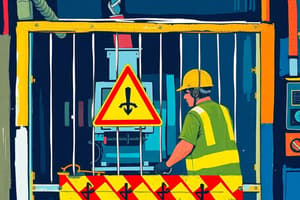Podcast
Questions and Answers
According to CSA, how long is the life of a hard-hat?
According to CSA, how long is the life of a hard-hat?
- 1 to 3 years
- 3 to 7 years
- 4 to 10 years (correct)
- 2 to 4 years
When should you inspect your safety harness or safety lanyard?
When should you inspect your safety harness or safety lanyard?
- After each use
- Before each use (correct)
- Monthly
- Weekly
What is the primary use of a double latched hook according to rigging and common safety practice?
What is the primary use of a double latched hook according to rigging and common safety practice?
- When load hook angle is curved
- When load hook angle is straight
- When load hook angle is diagonal
- When load hook angle is offset (correct)
What is the key to personal safety at an industrial plant?
What is the key to personal safety at an industrial plant?
How should you transfer a flammable liquid to a different container?
How should you transfer a flammable liquid to a different container?
Study Notes
Hard-Hat Lifespan
- CSA (Canadian Standards Association) recommends replacing hard hats every 5 years, regardless of condition.
- Hard hats should be replaced immediately if they have been impacted, even if no visible damage is apparent.
Inspection of Safety Harness and Lanyard
- Safety harnesses and lanyards should be inspected before each use to ensure they are in good working condition.
- Regular inspections should also be scheduled at least annually to assess wear and tear.
Double Latched Hook Use
- A double latched hook is primarily used in rigging to prevent accidental unhooking of loads.
- It provides an additional layer of safety, ensuring secure load handling during lifting operations.
Key to Personal Safety in Industrial Plants
- Awareness and training are crucial for personal safety within industrial environments.
- Workers should be familiar with safety protocols and their surroundings to minimize risks.
Transferring Flammable Liquids
- Use appropriate containers that are specifically designed for transferring flammable liquids.
- Ensure the area is well-ventilated and free from ignition sources during the transfer process.
Studying That Suits You
Use AI to generate personalized quizzes and flashcards to suit your learning preferences.
Description
Test your knowledge on millwright safety practices with this quiz! From inspecting safety harnesses to transferring flammable liquids, find out if you know the correct procedures. Choose the best answers and see how well you score!




